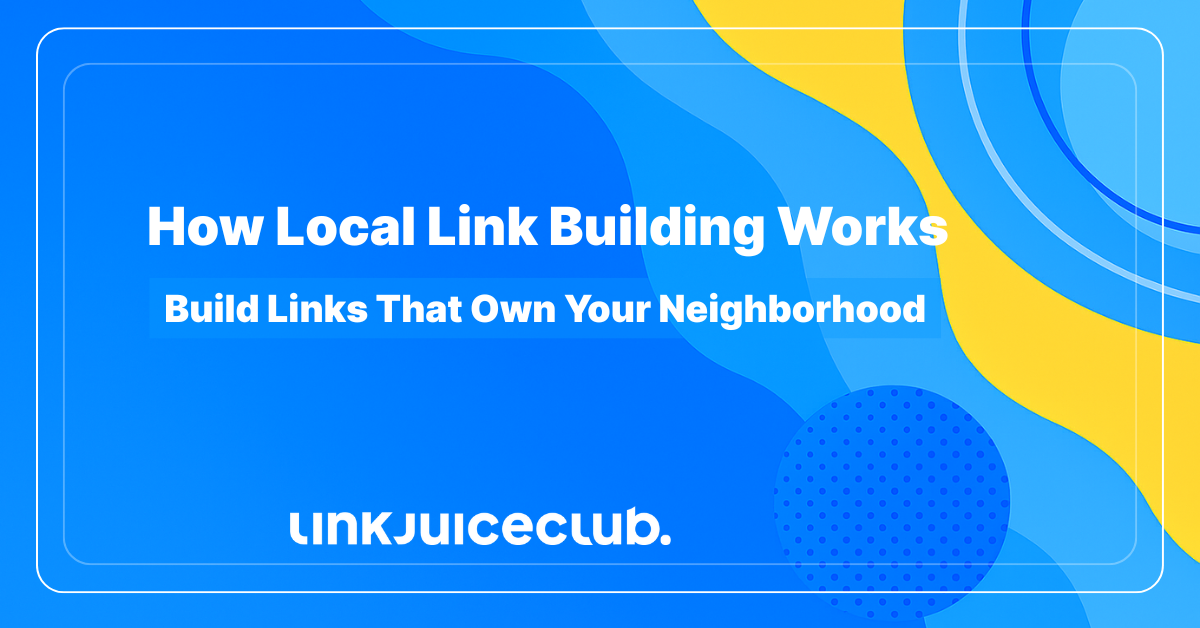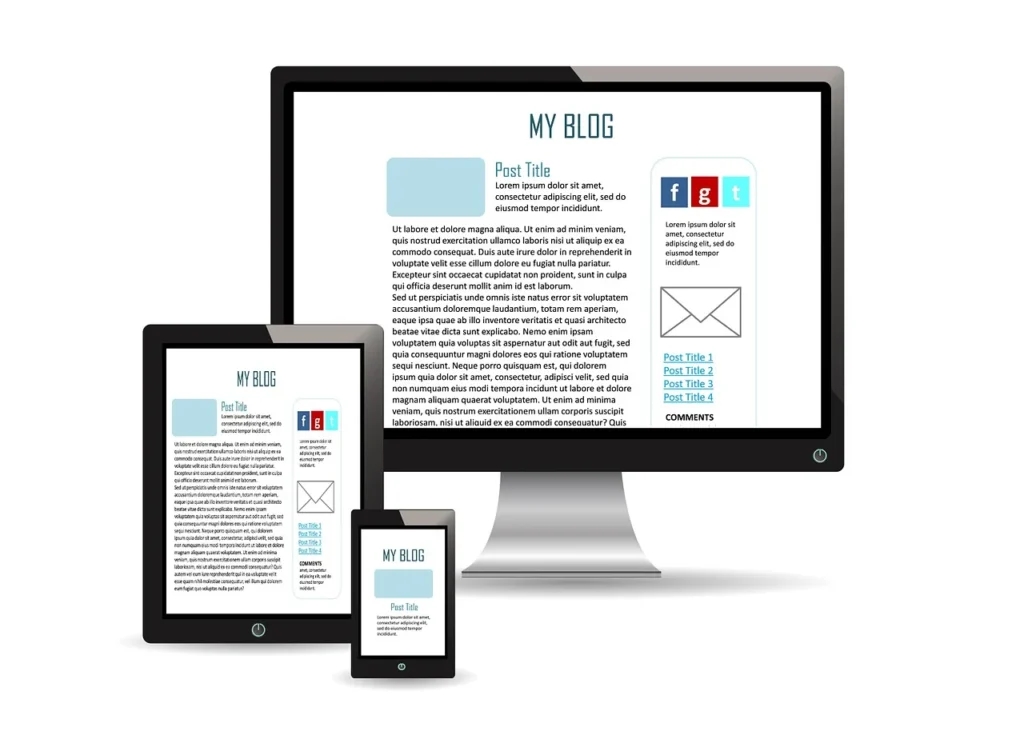
How Local Link Building Works (And Why It’s a Game-Changer)
Local link building has evolved! It’s no longer about blasting citations or submitting to every directory you can find. That approach is outdated.
The real wins come from building links that prove your business is rooted in the community and trusted by real people nearby.
This means earning backlinks from local websites, blogs, news sources, and platforms that have geographic relevance.
So, it’s not about link volume or domain ratings. It’s about proximity, authority, and trust, all wrapped into links that show Google you matter in your city or service area.
As AI Overviews begin influencing more of the search landscape, having those location-based signals in place will only grow in importance. If you want to show up on the map and dominate local results, your link building strategy has to evolve!

Why Local Links Hit Differently
When it comes to local link building, chasing high domain ratings or stacking link totals isn’t the winning play. Those surface metrics might impress on a dashboard, but they don’t always translate into local rankings.
What matters more is relevance: geographic and contextual. Google’s algorithm has evolved beyond basic authority signals. It now processes real-world connections through entity recognition, co-citation behavior, and local relationships.
That means a modest link from a local food blog or community news site can carry more weight than a national directory with ten times the DR.
The reason? Local links provide context. They signal to Google that your business isn’t just another entry in a database; it’s part of the neighborhood.
These mentions tell a story: that locals know you, that other businesses vouch for you, and that your brand fits naturally within the web of your city or service area.
Local Link Building That Actually Gives Good Results
It’s easy to get caught up in chasing domain authority scores or stuffing your backlink profile with vanity metrics.
But, as you could see, when it comes to local SEO, what truly matters is relevance and impact. The strategies below work perfectly when executed with precision.
1. Become a Local List Staple
One of the fastest ways to gain meaningful backlinks is by getting featured in city-specific roundup articles.
Think: Top Coffee Shops in Austin or Best Family-Owned Electricians in Denver. These types of lists carry serious local SEO juice, and if they’re actively updated, you should be doing everything possible to get on them.
The trick is in finding them. Once you spot a fit, reach out with a short, tailored message (no fluff, no templates). Make everything simple; explain who you are, what makes your business great, and why locals trust you.
More often than not, they’ll add you without blinking. 💥
2. Rethink Guest Posting: Local Authority > Generic Pitches
Most people are still stuck doing local guest posting like it’s 201. That strategy? Dead in the water.
If you want real authority, you need to write for local blogs that have real readers, current content, and geo-targeted rankings. Dig through Google using smart search footprints to find contributors’ pages, guest post invites, and actual blogs tied to your city or industry.
And when your article goes live? Make the links count. Point to a specific page, use branded or partial-match anchors, and throw in a reference to a local news outlet or .gov page to dial up trust.
Don’t forget to write a real author bio that connects you to the city, not some generic fluff. 😎
3. Turn Local Events Into Link Opportunities
Events are underrated goldmines for local links. Instead of just sponsoring and walking away, use the opportunity to lock in relevant backlinks.
Whether you’re donating to a fundraiser, organizing a cleanup day, or offering local discounts to first responders, make sure your brand gets a digital mention alongside your contribution.
Don’t wait for them to offer! Ask for a link to be added to their supporter or partner page. Better yet, offer to include them in your own content as well. 📝
4. Use Local Charities and Nonprofits to Build Real Trust (and Links)
Community involvement isn’t just good PR; it’s a smart local SEO move too. By supporting local schools, shelters, sports teams, or nonprofit events, you open the door to high-trust backlinks from .org domains and well-respected community pages.
It could be a donation, a free service, or a local giveaway.
Once involved, politely ask for a mention on their supporters or partners page. A shoutout in a newsletter or an event calendar listing is also valuable. These links carry serious weight because they’re tied to real-world relationships, and they boost both your digital reputation and your local visibility. ✊
5. Tap Into What’s Already Ranking
Local link building doesn’t need to start from scratch. One of the smartest ways to get traction is to analyze which backlinks are already helping your local competitors rank.
Tools like Ahrefs and Semrush make it easy to reverse-engineer these links.
Drop in the URLs of top-ranking businesses in your city, then zero in on dofollow links, country-specific traffic, and domains with local signals in their names or content. 🤝
6. Build a Hyper-Local Entity Web
Creating a Google Business Profile is just the starting point. What really makes your business stand out is how well you show up across the rest of the internet.
That means setting up local profiles on sites like Yelp, Facebook, your local Chamber of Commerce, and even joining in on conversations in community forums, subreddits, or Quora threads
Make sure that all of these profiles connect back to each other.
This strategy, known as entity stacking, sends consistent signals to Google about your legitimacy, location, and relevance. When done right, it creates a web of structured information that Google can parse and trust. 🌐
7. Create Link-Worthy Local Resources That Actually Get Shared
If you want other local businesses and blogs to link to your site, give them a real reason to.
Ditch the outdated infographics and focus on creating hyper-local resources that actually serve your community. Think along the lines of a Moving to [City] Starter Guide. Even a Best Places to Work Remotely in [City] list can catch fire if done right. These kinds of assets are practical, location-specific, and exactly the type of content people love to reference and share.
Once your resource is live, reach out to everyone featured or mentioned in it. Let them know they’ve been included and invite them to share it. Most will be happy to link back or promote it to their audience. 📍
8. Old Local Domains, New SEO Weapons
Scoop up expired domains from local businesses that used to be active in your city or niche. These could be restaurants, agencies, hobby shops, anything that once had real local backlinks pointing to it.
Once you find a good one, either redirect it to your homepage or rebuild it into a supporting microsite that links back to your main property. You’ll instantly inherit a handful of hyper-relevant local links without cold emailing anyone.
Just make sure the domain has clean anchor profiles and is still indexed by Google!
Play it smart though. This tactic is powerful but shouldn’t be overdone. Don’t redirect ten domains in a week. Drip them in slowly, and only use domains that genuinely make sense for your market. 🪖
9. Get Listed as a Trusted Local Authority
There are pages out there specifically built to showcase local experts, and they’re a goldmine for link building. Think lists like Top Home Renovation Pros in Atlanta or Coaches to Watch in Leeds. They exist in almost every niche and market.
Your job? Find them and pitch yourself with a short, value-focused message that explains what you do and why you should be included. 🔒
Keep Score or Get Left Behind!
Link building doesn’t end once the backlink goes live. If you’re not tracking every link you build, you’re flying blind.
A dead link six months down the line is more than a lost SEO win; it’s a waste of time and resources.
The more locally relevant signals you collect, the stronger your authority becomes in that geo. And when you control relevance, you control rankings!
The Local Link Blueprint: Outrank With Relevance, Not Volume
Here’s the raw truth: in local SEO, it’s not the loudest that wins – it’s the most trusted. You don’t need a mountain of DR70 backlinks to dominate your city.
What you need are digital signals that say This business is rooted here. People know it. People trust it.
You could stack thousands of generic links and still get outranked by a mom-and-pop shop mentioned on church newsletters, community roundups, or a city blog with ten loyal readers.
Here’s what you should remember:
- Local trust signals beat domain metrics 💥
A mention on a school fundraiser or .org nonprofit page tied to your city packs more punch than a syndicated guest post on some random tech blog.
- Most competitors are asleep at the wheel 💥
Even today, local markets are full of outdated SEO tactics and cookie-cutter link packs. If you’re using fresh strategies, you’re already ahead.
- Execution > theory 💥
You don’t need 500 ideas. You need 3 done right and repeated ruthlessly across every zip code you serve.
The real edge is combining consistency with creativity. If you build your links like you’re building local reputation, you’ll not only rank, you’ll own the entire block.





